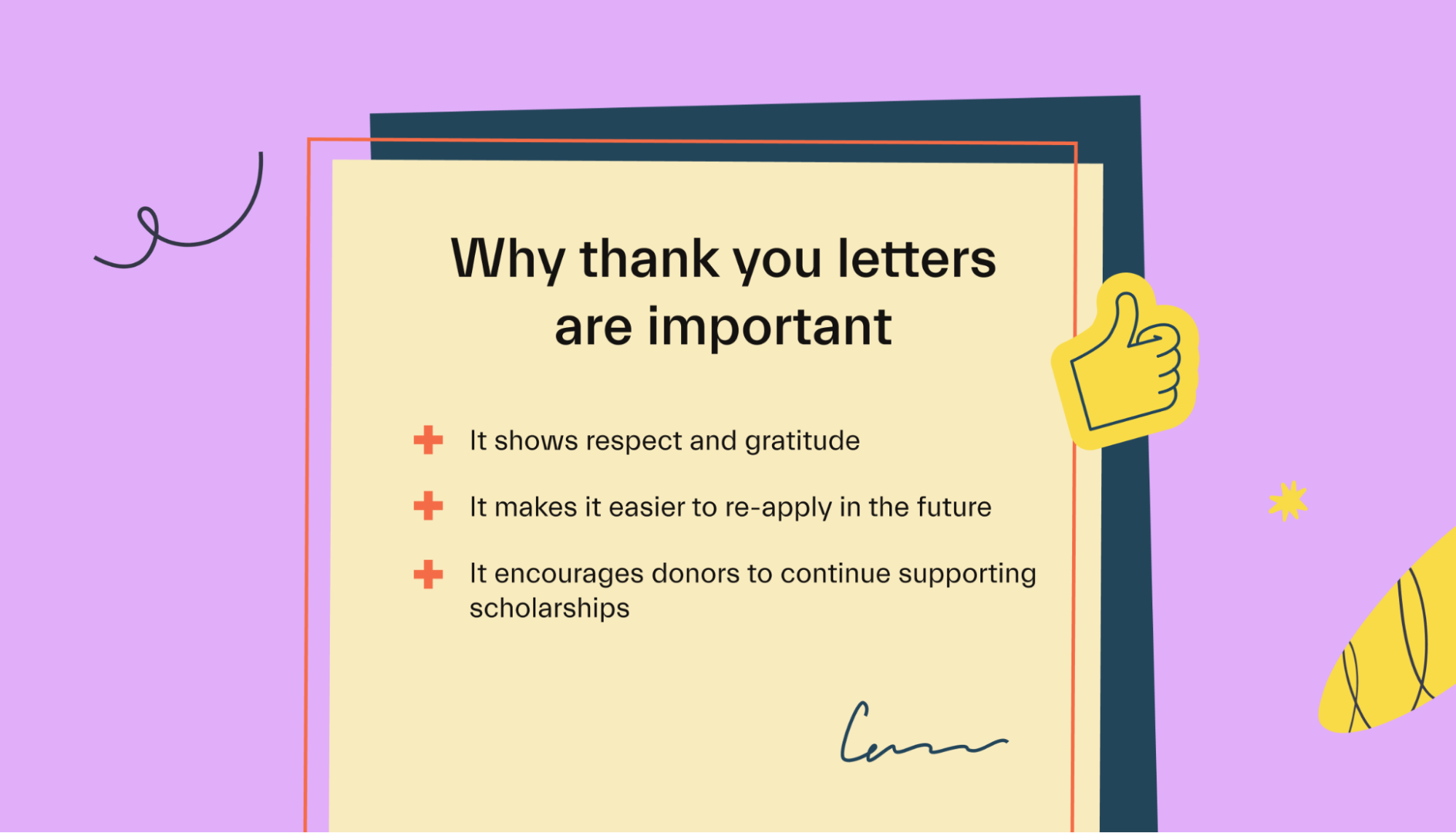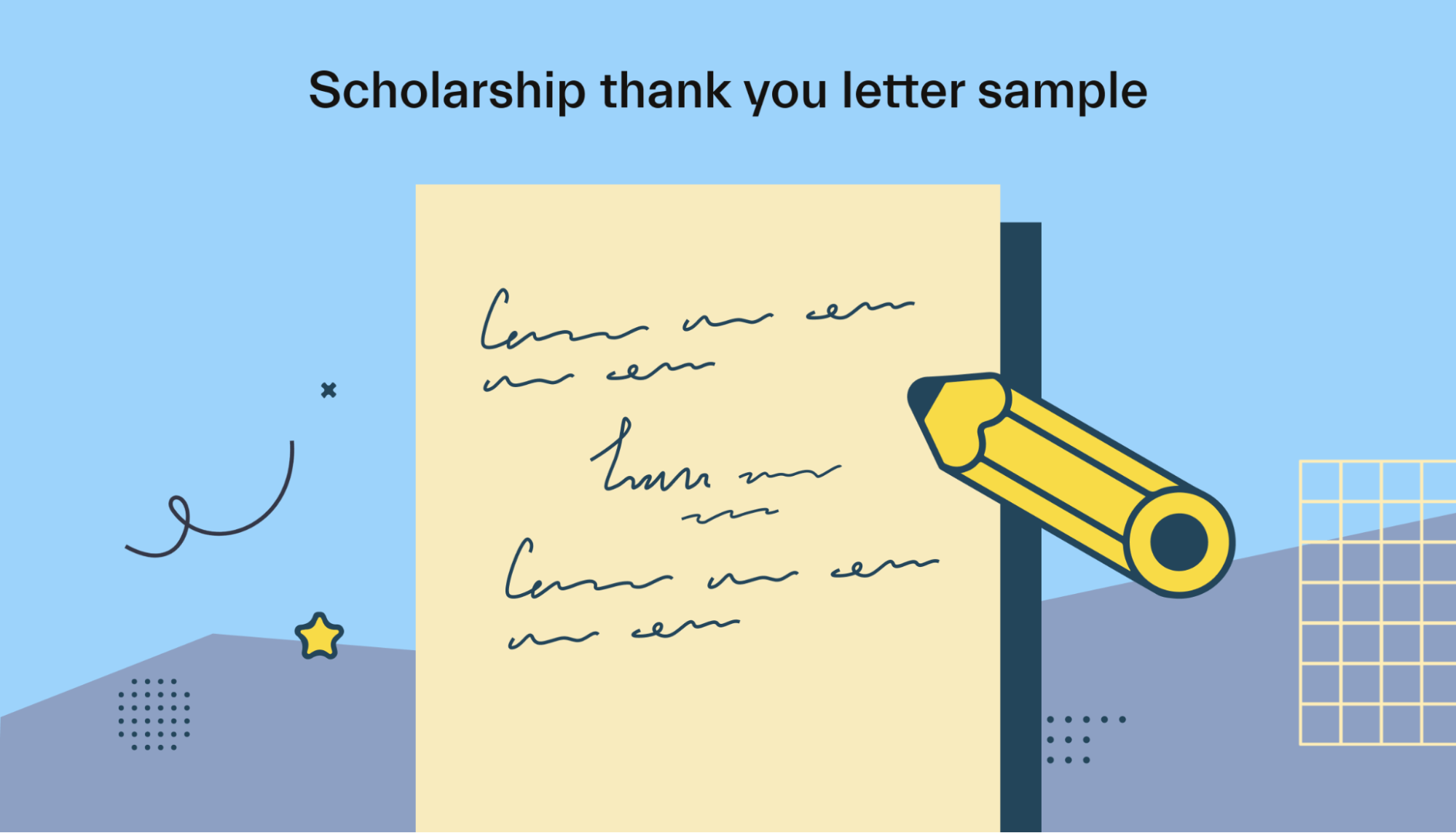Scholarships •
How to write a scholarship thank you letter
A scholarship thank-you letter is a way to thank your scholarship donor for their generosity. And there are some benefits for the student, as well.

It’s no secret that college can be expensive—so any opportunity to lower your cost of attendance is great!
When it comes to paying for college, scholarships are one of the key tools that should be in your financial toolbox. And when you’re lucky enough to receive a scholarship, it’s very important to be grateful—and to express your gratitude through a scholarship thank you letter!
In this guide, you’ll learn everything you need to know about scholarship thank you letters—including how to craft a well-written letter to thank your generous donor.
What is a scholarship thank you letter?
A scholarship thank-you letter is just what it sounds like: A letter sent from a scholarship recipient (you!) to the donor who paid for the scholarship.
The aim of a thank you letter is to:
Thank the donor for their generous contribution
Tell the donor a bit about yourself
Explain how the scholarship will help you reach your goals
A good thank you letter should be sincere, honest, and well-written—but it doesn’t need to be long. You can write a brief letter in just a few paragraphs.

Thank you letters are worthwhile for any type of scholarship, regardless of size. Whether it’s a full-ride scholarship or a $500 niche scholarship, thanking your donor is very important.
Your thank you letter should be addressed and sent to the party that funded your scholarship.
In many cases, you won’t necessarily know the identity of the donor—or even the organization—who funded your scholarship. In this case, you can simply send the letter to your school’s financial aid office. The office will then forward the letter to the appropriate donor.
Why thank you letters are important
Expressing gratitude is important regardless of the context, but it’s particularly important for scholarship recipients.

Writing a thank you letter is important because:
It shows respect and gratitude. The scholarship funder generously donated their money to support a stranger’s education. The simple act of a student sending a thank you letter can go a long way toward making the donor’s day!
It makes it easier to reapply in the future. Many scholarships are available every academic year. While some exclude past recipients from reapplying, others welcome return applicants. If you receive a scholarship and send a genuine thank you letter, it could help your chances of receiving the scholarship in future years. It certainly won’t hurt!
It encourages donors to continue supporting scholarships. From the donor’s perspective, a thank you letter can go a long way. Funding scholarships means that these donors are choosing to spend their hard-earned money to benefit strangers.
Receiving even a simple thank you letter can remind donors why they are offering their generous support—and may encourage them to keep supporting other students in the future.
How to write a scholarship thank you letter
A scholarship thank you letter should be honest, genuine, and brief. You should aim to express your sincere gratitude for the gift you have been given.
It’s best to make it personal. Explain who you are and how the scholarship will benefit you. If applicable, also explain how you plan to use your degree in the future.

You can use a scholarship thank you letter template (see below) if you want or draft your own simple letter.
While you do want to introduce yourself and your background, remember the purpose of the letter: To thank the donor. It’s best to thank the donor directly, both in the opening paragraph and again in the closing paragraph.
What to include in the letter
Here’s what students should include in scholarship thank you letters:
A direct “thank you” in the introduction. This can even be the first sentence of your letter. You want to lead with a direct expression of gratitude before diving into your background or how you will benefit from the scholarship.
A brief personal background. Next, introduce yourself and explain a bit about who you are. Focus this section on your life aspirations, personal goals, and how this all relates to your education.
An explanation of how the scholarship will impact you. Get specific here. Explain how the scholarship funds will enable you to focus on your studies or attend a school you wouldn’t normally be able to afford. Donors appreciate direct explanations of how their gifts will impact students.
A closing “thank you.” End your letter with another direct expression of gratitude. Keep it simple—you’ve already explained how you will benefit, so this is simply to close out the letter and remind the donor of your sincere gratitude.
What not to include
Here are a few things that are best left out of a thank you letter:
Financial specifics. You don’t need to include details on the amount of the scholarship you were awarded. Many donors don’t even know how much each student is being given. Often, a donor will contribute a certain amount—$10,000, for example—and then the scholarship committee decides how that money will be allocated across different scholarship(s).
Scholarship selection specifics. You don’t need to include anything that implies that the donor chose you for the scholarship—because chances are, they didn’t! Again, donors contribute the funds, but scholarship committees typically choose who receives the scholarships. A donor might be on that committee, but often they aren’t.
Tips and tricks
Here are some tips and tricks to keep in mind while drafting your letter.
It doesn’t need to be long. Keep it brief, adding as much detail as you’d like.
Focus on showing the scholarship's impact on you and your community.
Be sincere, honest, and grateful.
Be enthusiastic!
Open and close with an expression of gratitude.
Send a physical letter, an email, or both.
Consider following up later.
To expand on this last point, it can be helpful to follow up in future years with an update. This is particularly important for significant scholarships that greatly affect your academic budget.
For example, if you receive a life-changing scholarship, donors will likely appreciate additional updates in future years. You could consider sending a brief update at the end of each academic year or just one after you graduate.
For bonus points, you could even follow up years after graduation when you’re working in your field of choice. Donors will surely appreciate seeing a direct example of a student finding success in their line of work, thanks to the donor’s generous contributions!
Finally, keep the dialog open. If the donor replies, make a note to follow up with them in the future. This could be a valuable connection for you, both personally and professionally.
Sample scholarship thank you letter
Below is an example of a well-written scholarship thank you letter.
The letter checks off all the important boxes: It’s genuine, enthusiastic, informative, and concise.

[Date]
[Your name]
[Your address]
[Donor name]—address to your school’s financial aid office if donor information isn’t known.
[Donor address]—if known
Dear [Scholarship Donor],
I am honored to be one of the recipients of the [Scholarship Name]. Thank you for your generous support.
I am a first-generation college student, as no one in my family has attended college. I am humbled to receive the generous scholarship support. It will directly enable me to attend [university name] and pursue my dream of becoming a nurse.
I have always been eager to help others. My humble upbringing and experience with poverty have taught me valuable lessons about supporting your community. This desire to help others has led me to pursue a career in medicine, where I hope to use my talents to serve underprivileged communities.
I am grateful to receive this scholarship and to be accepted into [university name]. For the next several years, my entire focus will be on pursuing my education to the best of my ability. Your generous support will enable me to focus on my studies and volunteer work without worrying about paying for my education.
Thank you sincerely for your generosity and support. It means the world to me.
Sincerely,
[Your Name]
Scholarship resources for students
Writing a scholarship thank you letter is important. But first, you need to win a scholarship!
Plus, even if you already were awarded a scholarship, that doesn’t mean you can’t apply for more! Many students combine several scholarships, plus financial aid, to pay for school.
Scholarships are one of the best ways to pay for college, as they don’t need to be paid back (unlike loans).
Here are some helpful resources to help students land more scholarships.
How to find scholarships
One of the best ways to find scholarships is to use Mos. Mos is a banking solution for students, and Mos members receive access to the largest scholarship pool in America! Mos also makes it easier to find scholarships you qualify for and directly apply for opportunities.
Other options include this scholarship search engine from the Department of Labor and the financial aid office at the school you plan to attend. StudentAid.gov also has a list of valuable scholarship resources for students.
How to write a scholarship essay
Many scholarships require an essay as part of the application process. A good scholarship essay should:
Follow all the instructions precisely
Be written with the audience in mind
Be based on a topic that the student is passionate about
Be submitted on time (or early, if possible)
For more information, check out our full guide on how to write a scholarship essay.
How to get a scholarship
When you apply for a scholarship, you will be competing with other students for a limited number of awards. How do you stand out and improve your odds?
Focus on scholarships that you qualify for and that are relevant to you or your field
File the FAFSA first, as this is a prerequisite for many scholarships
Apply early, and apply for many different opportunities
Don’t overlook smaller scholarships and easy scholarships
Look for smaller, local scholarships that may have less competition
For more information, check out our guide on how to get a scholarship.
Conclusion
A scholarship thank you letter shows your gratitude and can encourage the generous donor to continue supporting other students.
There may be a direct benefit to you, as well: If you plan to reapply for the same scholarship in future years, writing a well-crafted letter is even more beneficial.
Want to learn more about preparing financially for college? Check out our full guide on how to pay for college. And if you want a powerful bank account for students that also helps you find and apply for scholarships, be sure to check out Mos!
Let's get
your money
- Get paired with a financial aid expert
- Get more money for school
- Get more time to do you








